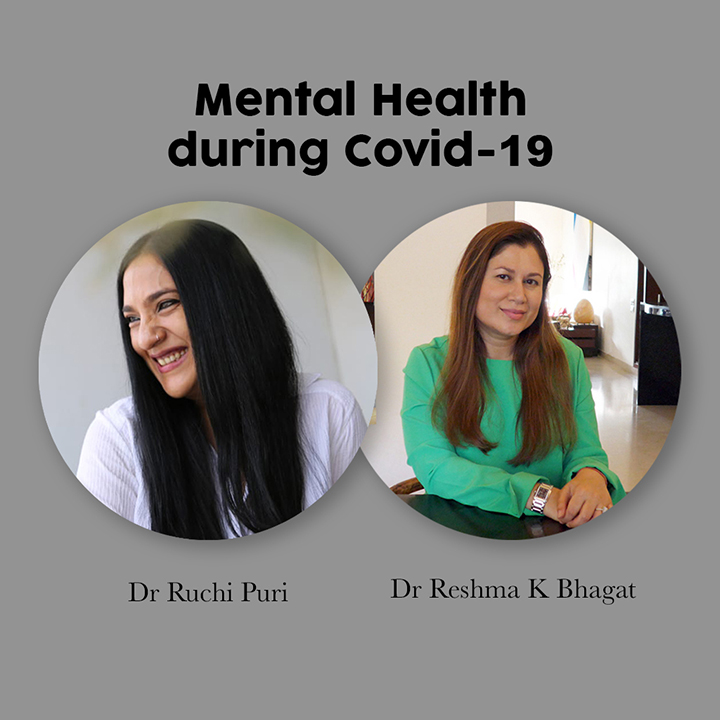In times of a pandemic, measures to battle the virus can lead to a stressful life. However, proper management and professional help can ensure a healthy mind
Lockdowns are being extended to minimise the spread of Coronavirus and people around the world are facing a stressful time. In such a scenario where the world is at war to preserve the physical well-being of individuals, the need to ensure mental well-being should not be forgotten.
Prolonged isolation because of the social distancing and lockdowns can wreak havoc on mental health. To better understand its importance and to ensure this is not the case, Dr Ruchi Puri, GP, mental health counsellor and life coach shares a few valuable insights. She specialises in counselling on Lifestyle Disease Management which covers Stress and Time Management, Effective Parenting, Depression, Marriage Counselling, Family counselling, Addictions, Death and Bereavement, Puberty, Nutrition and related topics,
As we may all be aware, until a vaccine or herd immunity are not developed, the ‘new normal’ including restrictions on movements will have to be followed. To deal with the new normal we are facing, Dr Puri suggests embracing the situation rather than feeling victimised by it.
“We need to embrace this time and also look at all the good it has done us, and if handled well what good it can do for us and the planet at large,” she says. Her advice is to understand social distancing for what it is — physical distancing and not social or emotional distancing.
To navigate the situation and cope with the stress and restrictions, she advises creating a daily routine for yourself which will give your day a structure. This should include waking up, meals, work, recreation, exercise and sleep. Eat healthy nutritious food and also re-evaluate how much you eat considering that physical activity may have gone down.
Exercise with breathing exercises, stretches and relaxation techniques should ideally to be done in the morning to start your day with a calm disposition. Allow time for recreational activities including playing interactive games or reach out to family members and friends. Use the time to wind down by reading, journaling or listening to music.
Since the WFH (work from home) culture seems to be here to stay, she suggests the creation of a clearly designated area for work and for recreation and giving member of the family, regardless of age, their privacy. Avoid starting or ending the day by watching the latest updates on Covid-19 as this will start or end your day on an anxious note. Allocate short periods for scrolling through the updates.
“This is a great time to do all the things and work on developing the skills that you have not had the time to do earlier,” she says. However, she also adds that you do not have to emerge from this time with freshly acquired skills. “It is perfectly fine to not have baked bread yourself. It is ok to have just stayed healthy and happy and to have done only as much as you have always done socially professionally and personally,” she says.
Since this time is especially trying for parents managing both work from home and kids at the same time, Dr Puri stresses upon the need to learn from children. She says, “Why can we not understand the music they listen to, watch the shows that they see or learn the language they use. This will help bridge the generational gap that may have been created over time. When a teacher becomes a student it results in a better teacher”.
She also emphasises using the time to teach children empathy which in the long run will help them grow up to be responsible adults. “A good way of doing this is to reach out to someone outside of your social circle who lives alone and maybe the elderly. Make it your responsibility as a family to look into their overall well-being. When the children sense the difference they can make in someone else’s life it starts their journey to mindfulness and kindness” she says.
For parents with toddlers, her advice is to create a child-safe play area with a playpen where you can keep an eye on them while you work. “Toddlers love playing with things that get them messy, so allow them to eat themselves or colour as you go about your day. Their bath time can be post their playtime and when you need a break from work”.
However, despite taking precautions and trying to cope with trying situations, there may be times when things get difficult to handle. For people who may be going through stressful times due to the pandemic, it is very important to be on the lookout for signs that could indicate the presence of mental health problems.
Some of the signs that Dr Puri suggests people should be on the lookout for include sleep disturbances and ruptured circadian rhythm; increased or decreased appetite, feeling anxious and tired all the time, emotional outbursts and crying for no apparent reason, developing an unreasonable fear of eventually going out, mood swings, screen addiction, smoking or drinking alcohol and difficulty in focusing on anything.
If such signs are witnessed, Dr Puri says, “Ideally one should speak to a psychiatrist or any mental health professional. Most people prefer to ask friends and family and go to someone that they recommend. Most hospitals also have mental health professionals on board”.
The current pandemic is testing time for everyone and as the normal way of life changes, it is advisable to be well informed. Dr Puri says, “It is prudent to be well informed but from the right sources. Accept that this is our current reality and that we must make the changes we need to make to stay calm, motivated and safe. Please do not panic and do not spread panic”.
Dr Reshma is an advocate of wellness, prevention and holistic health. Instagram handle: dr.reshmakhattarbhagat





